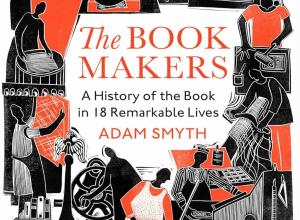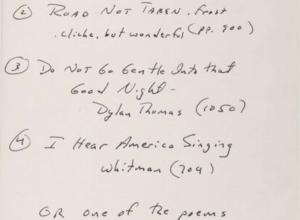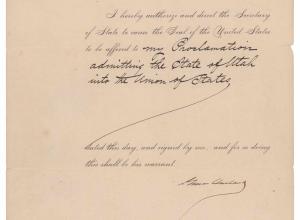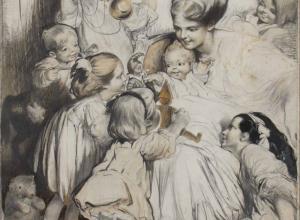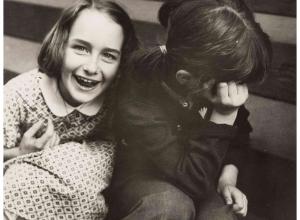Exhibition of J.D. Salinger Letters Opens at the Morgan in September
New York, NY, August 14, 2013—Between 1941 and 1943 J. D. Salinger sent nine letters and postcards to Marjorie Sheard, an aspiring Canadian writer. This important collection of documents, acquired by the Morgan in April 2013, sheds light on Salinger’s writing, and the authors that influenced him in the early stages of his career. A highlight among the letters is one in which the young author writes to Ms. Sheard of “the first Holden story” about a “prep school kid on his Christmas vacation.” The Morgan will display the complete correspondence in a show entitled “Lose not heart,” the first public presentation of these revealing letters, on view from September 10, 2013 to January 12, 2014.
In the summer of 1941, when Salinger began writing letters to Sheard, he was twenty-two years old. A Toronto resident, Sheard had read Salinger’s early short stories in publications such as Esquire and Collier’s and initiated the correspondence by writing an admiring letter. Salinger was apparently eager to begin and maintain a correspondence with the insightful Sheard, and he began to share news of his own creative output. A letter dated November 18, 1941, references the creation of the first story featuring his now legendary character, Holden Caulfield, hero of Catcher in the Rye. The New Yorker had accepted the piece and, Salinger wrote, was now asking for an entire series about the character. He ended the letter by asking for Sheard’s reaction to the story.

Overall, the correspondence reveals a young writer simultaneously frisky, acerbic, and encouraging. In a letter dated September 4, 1941, Salinger wrote to Sheard that it “seems to me you have the instincts to avoid the usual Vassar-girl tripe.” He goes on to recommend that she submit her work to smaller literary magazines with a discerning readership. “You can’t go around buying Cadillacs on what the small mags pay, but that doesn’t really matter, does it?” In another letter, after The New Yorker declined to publish a story she had written, Salinger encouraged her to “lose not heart.”
The letters span the first two years of Salinger’s wartime military training, prior to being deployed to Britain in advance of the Allied invasion of Normandy and Operation Overlord, in which Salinger fought. Salinger’s letters portray his basic training as a combination of bemusement and boredom.
Other letters reveal Salinger struggling with the “Holden” series. He also alludes to additional unpublished short stories which he feels might have literary value for a wider audience, but then cynically writes, “I’ll probably fail completely with it.”
Ms. Sheard, who died earlier this year at age 95, stored the cache of letters in a shoe box in a closet. Several years ago she moved to a nursing home, giving the Salinger letters to family members for safekeeping. As the cost of her nursing care increased, Sheard and her family made the decision to sell the letters to the Morgan, which has a growing collection of correspondence by Salinger.
ORGANIZATION AND SPONSORSHIP
Lose not Heart is organized by Declan Kiely, Robert H. Taylor Curator and Head of the Department of Literary and Historical Manuscripts at the Morgan.
The programs of The Morgan Library & Museum are made possible with public funds from the New York City Department of Cultural Affairs in partnership with the City Council, and by the New York State Council on the Arts with the support of Governor Andrew Cuomo and the New York State Legislature.
THE MORGAN LIBRARY & MUSEUM
The Morgan Library & Museum began as the private library of financier Pierpont Morgan, one of the preeminent collectors and cultural benefactors in the United States. Today, more than a century after its founding in 1906, the Morgan serves as a museum, independent research library, musical venue, architectural landmark, and historic site. In October 2010, the Morgan completed the first-ever restoration of its original McKim building, Pierpont Morgan’s private library, and the core of the institution. In tandem with the 2006 expansion project by architect Renzo Piano, the Morgan now provides visitors unprecedented access to its world-renowned collections of drawings, literary and historical manuscripts, musical scores, medieval and Renaissance manuscripts, printed books, and ancient Near Eastern seals and tablets.
Location
The Morgan Library & Museum
225 Madison Avenue, at 36th Street, New York, NY 10016-3405
212.685.0008
Just a short walk from Grand Central and Penn Station
Hours
Tuesday-Thursday, 10:30 a.m. to 5 p.m.; extended Friday hours, 10:30 a.m. to 9 p.m.; Saturday, 10 a.m. to 6 p.m.; Sunday, 11 a.m. to 6 p.m.; closed Mondays, Thanksgiving Day, Christmas Day, and New Year’s Day. The Morgan closes at 4 p.m. on Christmas Eve and New Year’s Eve.
Admission
$18 for adults; $12 for students, seniors (65 and over), and children (13-16); free to Members and children 12 and under accompanied by an adult. Admission is free on Fridays from 7 to 9 p.m. Admission is not required to visit the Morgan Shop and Café.






